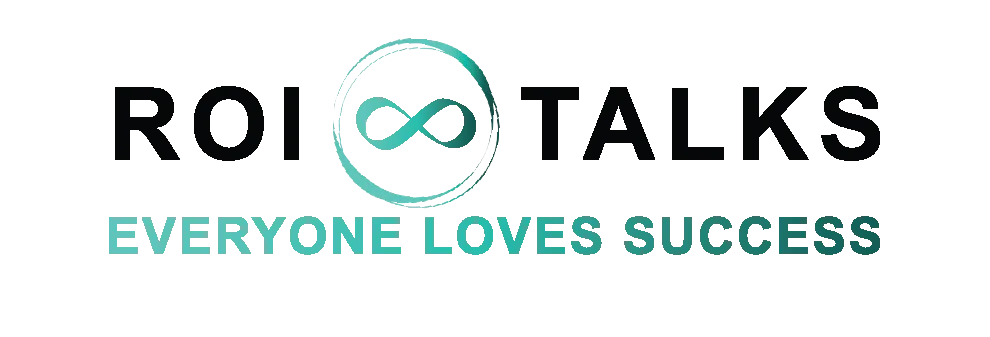Everyone Loves Success
ROI TALKS
Roi Talks Blog

When the Going Gets Tough, the Tough Get Going
When times get tough, it can be tempting to throw in the towel and give up. Billy Ocean is one of the singers I truly adore. If you have not heard his song "When the Going Gets Tough, the Tough Get Going" then I would strongly suggest and recommend you do so.
"When the Going Gets Tough, the Tough Get Going" is attributed both to Joseph P. Kennedy (1888-1969), father of the USA President John F. Kennedy and to Norwegian-born American football player and coach Knute Rockne (1888-1931).
This popular saying, "When the Going Gets Tough, the Tough Get Going" means “when the situation becomes difficult, remember to tap into your inner strength which allows you to step up and handle the given situation with courage, clarity, conviction and compassion ”.
The saying speaks to the importance of resilience and determination in the face of adversity. Toughness is not just about being physically strong, but it's also about possessing emotional, mental and spiritual strength. When we encounter difficult situations, we need to be able to rely on our inner resources to keep going. These resources come from courage, clarity, conviction, and compassion towards oneself and others.
Anti-fragility, resilience, and well-being are all related concepts that can be further understood through the lens of courage, clarity, conviction, and compassion.
Courage is an essential quality to have when facing difficult situations. It allows us to face our fears, take risks, and stand up for what we believe in. Courage is not the absence of fear, but the willingness to face it and act despite it. For example, a person who has lost their job due to the pandemic may feel afraid and uncertain about their future. However, if they have the courage to face the situation and take action, such as retraining for a new career or starting a business, they can turn the situation around.
Research has shown that having courage leads to greater success in life and can even have physical health benefits. In a study published in the Journal of Personality and Social Psychology, individuals who demonstrated courage in the face of stress had lower levels of cortisol, the hormone associated with stress and anxiety, compared to those who did not. This suggests that being courageous can have a positive impact on our physical and mental health.
Clarity is also crucial in tough times. When things get chaotic and uncertain, it can be easy to become overwhelmed and lose sight of what truly matters. However, by focusing on our goals and priorities, we can find a sense of purpose and direction. Clarity involves being clear about what we want to achieve and how we plan to achieve it. This can involve setting specific goals and breaking them down into smaller, more manageable steps.
A study published in the journal Emotion found that people who had a clear sense of purpose were more resilient in the face of challenges and had greater overall well-being. This suggests that having clarity can help us navigate difficult situations with greater ease and maintain our mental and emotional well-being.
Conviction is another essential quality when the going gets tough. It is what drives us to persevere and push through obstacles. Having a strong sense of conviction allows us to stay focused on our goals and not get deterred by setbacks. Conviction involves having a deep belief in ourselves and our abilities, even when things get tough.
In a study published in the journal Motivation and Emotion, individuals who had a higher level of conviction towards their goals were more likely to persevere in the face of obstacles and ultimately achieve success. This suggests that having conviction can help us stay motivated and committed to our goals, even when the road ahead is challenging.
Compassion is also essential when the going gets tough. It's important to be kind to ourselves and others during challenging times. Self-compassion involves treating ourselves with kindness, understanding, and acceptance, even when we make mistakes or face difficulties. Compassion towards others involves being empathetic and supportive towards those around us who may also be struggling.
Self-compassion has been found to be an essential component of resilience. A study published in the Journal of Personality found that individuals who practised self-compassion were better able to cope with stress and had greater well-being overall. Similarly, compassion towards others can also help build resilience and foster social support. When we feel connected to others and have a support system in place, we are better able to navigate challenging situations.
To truly embody the "When the Going Gets Tough, the Tough Get Going" mentality, it is important to cultivate anti-fragility. Anti-fragility refers to the ability to not only withstand stress and adversity but to thrive in it. This concept was popularized by author Nassim Nicholas Taleb. Rather than simply being resilient, individuals and organizations can become anti-fragile by embracing and even seeking out challenges and adversity. By doing so, they become stronger and more adaptable in the face of uncertainty.
One way to cultivate anti-fragility is through the practice of well-being. Well-being involves taking care of our physical, emotional, mental and spiritual health. This includes engaging in activities that promote relaxation, such as mindfulness meditation or yoga, getting regular exercise, and eating a healthy diet. Research has shown that individuals who practice well-being have better-coping skills and are more resilient in the face of adversity.
For example, a study published in the Journal of Psychiatric Research found that individuals who engaged in mindfulness meditation had lower levels of perceived stress and greater resilience compared to those who did not. Another study published in the Journal of Happiness Studies found that individuals who engaged in regular physical activity had greater emotional well-being and were better able to cope with stress.
Anti-fragility emphasizes the importance of embracing challenges and seeking out discomfort as a means of growth and adaptation. To cultivate anti-fragility, individuals need to have the courage to face difficult situations and take risks, even when there is no guarantee of success. This requires a willingness to expand your comfort zones and embrace uncertainty.
Resilience involves being able to adapt to changing circumstances and overcome obstacles. To build resilience, individuals need to have the courage to face difficult situations, the clarity to understand their goals and priorities, the conviction to stay motivated and committed to their goals, and the compassion to be kind to themselves and others during challenging times.
Well-being involves taking care of our physical, emotional, mental and spiritual health. By practising well-being, individuals can build the inner resources they need to face difficult situations with greater ease and maintain their mental and emotional well-being.
Anti-fragility, resilience, and well-being are all related concepts that can be further understood through the lens of courage, clarity, conviction, and compassion. By cultivating these qualities and practising well-being, individuals can build the inner resources they need to not only withstand stress and adversity but to thrive in it.
"When the Going Gets Tough, the Tough Get Going" is about drawing upon your inner resources of courage, clarity, conviction, and compassion. These qualities help individuals to navigate challenging situations with greater ease and maintain their mental and emotional well-being. Additionally, cultivating anti-fragility through the practice of well-being can help individuals and organizations become stronger and more adaptable in the face of uncertainty. By embracing challenges and adversity, we can not only withstand them but also thrive in them.
ROI TALKS™
Marina Plaza - Office 1004 -1006
Dubai Marina, Dubai, UAE





